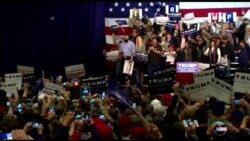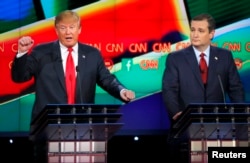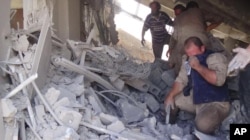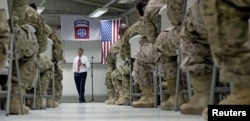Recent public opinion polls show a sea-change as to what issues Americans are most concerned about just weeks before the first votes are cast in Iowa and New Hampshire.
Terrorism and national security issues now hold sway, supplanting the economy as the top concern. This shift in emphasis is playing out on the presidential campaign trail and in recent candidate debates. There has been a particular focus on how the United States should counter the self-proclaimed Islamic State and what U.S. policy should be with regard to the civil chaos in Syria.
The Republican White House contenders have focused on these issues as part of a broader critique of President Barack Obama's foreign policy.
In a recent Republican debate aired on CNN, frontrunner Donald Trump vowed to destroy Islamic State jihadists as a key step in keeping the country safe from terrorist attack.
"We need toughness and we need strength,” he said. “We are not respected as a nation anymore and we don't have that level of respect that we need. And if we don't get it back fast, we are just going to go weaker and weaker and disintegrate. We can't allow that to happen."
In the same debate, Trump's main rival, Texas Senator Ted Cruz, favored an increase in airstrikes.
"Right now Obama is launching between 15 and 30 air attacks a day,” he said. “It is photo-op foreign policy. We need to use overwhelming air power, we need to be arming the Kurds and we need to be fighting and killing ISIS where they are."
ISIS is an acronym for the Islamic State.
Air power vs. ground forces
But Florida Senator Marco Rubio argued the key is putting together an international coalition of ground troops to take on Islamic State fighters.
"Airstrikes are a key component of defeating them,” he said, “but they must be defeated on the ground by a ground force, and that ground force must be primarily made up of Sunni Arabs themselves."
Rubio also spoke in favor of regime change in Syria, while Cruz and fellow Republican contender Rand Paul did not.
New Jersey Governor Chris Christie, who is rising in the polls in the early voting state of New Hampshire, suggested the United States also needs to be tougher in dealing with Russian involvement in the Syrian conflict. He said he supports a no-fly zone in Syria and included a warning to Moscow.
"And yes, we would shoot down the planes of Russian pilots if they were stupid enough to think that this president was the same feckless weakling that the president we have in the Oval Office is right now," Christie said in the recent Republican debate held in Las Vegas.
Democrats split on regime change
The debate over Syria and how to counter the Islamic State has also raged in the Democratic race.
In the recent Democratic debate in New Hampshire aired on ABC, frontrunner Hillary Clinton said she favored an aggressive military campaign against Islamic State fighters, but one that avoids using large numbers of U.S. troops.
"[Islamic State militants] want American troops back in the Middle East,” she said. “They want American soldiers on the ground fighting them, giving them many more targets and giving them a great recruiting opportunity."
Clinton supports regime change in Syria, but her two challengers, Vermont Senator Bernie Sanders and former Maryland governor Martin O'Malley, do not.
Sanders warned in the recent debate that the United States could get sidetracked with a focus to remove Syrian President Bashar al-Assad from power.
"It is not Assad who is attacking the United States. It is ISIS. And ISIS is attacking France and attacking Russian airliners," he said. "The major priority right now in terms of our foreign and military policy should be the destruction of ISIS."
Americans differ on deploying troops
Sanders also warned of the dangers of deploying U.S. ground troops into another lengthy war in the Middle East, a view that Republicans Trump, Cruz and Paul share.
This nonpartisan split over how and when to deploy large numbers of U.S. ground troops reflects an unresolved debate over the legacy of former President George W. Bush and his decision to invade Iraq back in 2003.
A recent CNN/ORC poll found the country divided over whether to deploy U.S. ground forces to fight the Islamic State in either Syria or Iraq. Forty-nine percent supported the idea while 49 percent opposed it, with two percent saying they were unsure.
A Quinnipiac Poll in December found 52 percent of those surveyed would support sending in U.S. ground troops, while 40 percent opposed it. In that same poll, Republicans supported using ground troops by a margin of 75 percent to 17 percent, while Democrats and Independents opposed the idea by narrow margins.
With the first votes in Iowa and New Hampshire fast approaching, analysts said concerns over terrorism in particular will play a dominant role in the 2016 campaign for many voters, especially on the Republican side.
"When it comes to terrorism where they think it could come to America, when they see ISIS beheading Americans or the attacks in Paris or San Bernardino, then it becomes a more real issue, and I think that is what Republicans are seizing on," said John Fortier, with the Bipartisan Policy Center in Washington.









